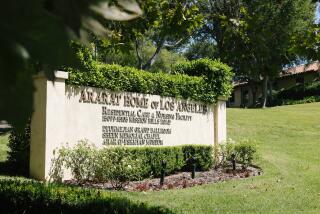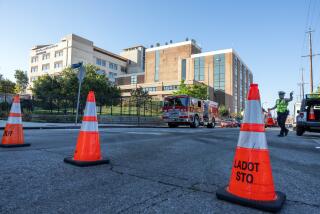Death Report Draws Probe
A team of state health inspectors arrived Tuesday at Los Angeles County-USC Medical Center to investigate claims by the hospital’s doctors that patients have died because they didn’t receive treatment soon enough.
The seven inspectors plan to evaluate conditions in the emergency room, psychiatric emergency room and laboratory, as well as review patient records, said county health department spokesman John Wallace.
The inspection came in response to articles in The Times last week that quoted sworn statements from doctors at County-USC -- including the interim emergency department chairman -- contending that four patients had died while waiting for care.
One doctor described the case of a 40-year-old woman with an arterial blockage in her lungs who was kept in the emergency room for more than 30 hours because an intensive care unit bed was not available. She died after suffering cardiac arrest, the physician said.
Another doctor said a 75-year-old woman who was admitted with a broken hip had to wait a week for surgery because no bed was available. She developed a blood clot from lying prone for so long and died, that physician said.
Dr. David Altman, the hospital’s chief medical officer, said officials had identified three of the four patients who died, and have given their medical records to state inspectors. They are trying to identify the fourth patient, he said.
Lea Brooks, a spokeswoman for the California Department of Health Services, said state law requires hospitals to report deaths classified as an “unusual occurrence” to Sacramento.
Although that definition leaves some room for interpretation, “if someone dies while awaiting treatment, to me that seems like something that would be an unusual occurrence,” she said.
Inspectors will examine the circumstances of the deaths to determine if the county should have reported them, Brooks said. The results of the visit will be released in several weeks.
The state health department is responsible for ensuring that hospitals comply with federal health regulations. In extreme circumstances, violations can result in termination of Medicare and Medi-Cal funds. But cited hospitals usually are given up to 90 days to correct problems.
Altman told County-USC staff members in an e-mail Friday that because of the Times articles, they should prepare for a possible “unannounced visit” by another set of inspectors -- from the Joint Commission on Accreditation of Health Care Organizations. That group accredits hospitals and can influence everything from a hospital’s reputation to its insurance contracts and liability insurance premiums.
“This means looking at matters of cleanliness, completeness of records, performance evaluations, etc., and fixing as many of the problems as possible,” Altman wrote.
Charlene Hill, a spokeswoman for the joint commission, said her agency would not discuss plans for any visit that is supposed to be a surprise. But she said hospitals can’t fix long-festering problems overnight.
“It’s not like an exam where you can pull an all-nighter,” Hill said. “When our surveyors go into a facility, they look for a track record, a demonstrated track record.”
Altman said in an interview that his e-mail was “reminding everybody about the necessity of adequate documentation and keeping that as neat as possible for current events.”
“Every hospital that knows it’s having a joint commission visit prepares for it,” he said. “You go from top to bottom, soup to nuts, to prepare for it.”
County supervisors indicated last week that the deaths came as a surprise. However, the supervisors were aware that long waits for care and staffing shortages had contributed to deaths in the past. In 2001, The Times reported that doctors blamed delays in emergency dialysis for the deaths of three patients.
As a result of that report, government health inspectors launched an inquiry that found deficiencies “so serious they substantially limit your capacity to give adequate care,” according to a 2001 letter from federal regulators to the county. The federal government also determined that the hospital no longer met the conditions required to participate in Medicare.
In that case, the hospital did not report the dialysis deaths to health inspectors, as required by law, officials said.
By December 2001, the county had made changes to meet federal requirements by training more nurses to provide dialysis.
The hospital passed a subsequent inspection.
More to Read
Sign up for Essential California
The most important California stories and recommendations in your inbox every morning.
You may occasionally receive promotional content from the Los Angeles Times.









